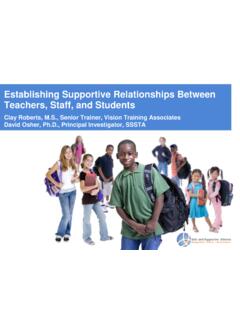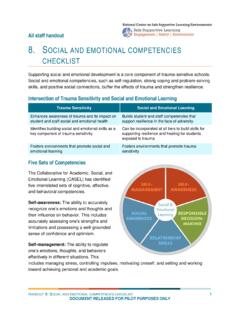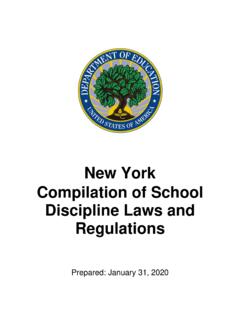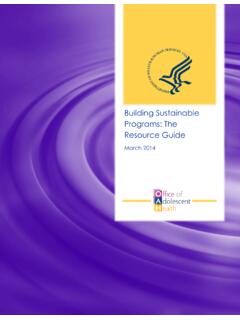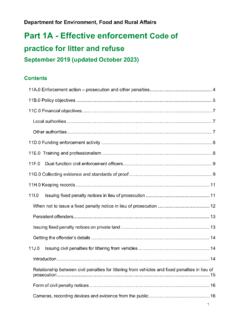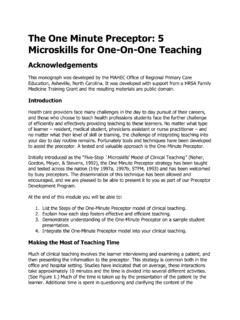Transcription of Triggers and Dissociation - ed
1 Triggers and Dissociation Triggers are sensory stimuli connected with a person s trauma, and Dissociation is an overload response. Even years after the traumatic event or circumstances have ceased, certain sights, sounds, smells, touches, and even tastes can set off, or trigger, a cascade of unwanted memories and feelings. When they do, the survivor might react with an adrenalin-charged fight-flight-or-freeze response or by dissociating. Dissociation separates a person emotionally from the trauma and, sometimes, from the current setting. Triggers initiate an emotion reflex Though Triggers can be generalized, as in the case of a loud noise, they may involve specific qualities, such as a particular song or the scent of aftershave.
2 These are some common Triggers : A sense of being ignored Aggressive behavior Angry facial expressions Anniversaries Bright lights Colors Completing forms Crowds Darkness Disorder/chaos Impatient authorities Lack of choices or options Long waits for services Lost privileges Loud or abrupt noises Not being believed Odors Requests to repeat one s story Signs and images Small spaces Songs Tone of voice It s not always obvious that traumatic stress has been triggered, and the resulting behavior can be off-putting. Thus, a trauma-sensitive approach makes no assumptions as to why a person might be rude, overly timid, argumentative, evasive, or manipulative. Signs of distress can take a range of forms.
3 Emotional Physical Behavioral Cognitive anger/rage headaches argumentative forgetfulness anxiety holding breath cringing, flinching fragmented recollection fear increased respiration crying inability to relate history helplessness light-headedness restless unable to decide powerlessness nausea spaced out, vacant stare unable to focus/concentrate sudden sadness rapid heart rate startle response unable to speak/respond worry rise in blood pressure stiffness/tension stomach aches suspicion sweating uncooperative trembling unresponsive Dissociation hides the feelings Dissociation ranges from a conscious decision to postpone dealing with feelings to a complete loss of touch with the present.
4 When something utterly overwhelming happens, some people detach from their emotions in order to function, perhaps even to survive. As a coping mechanism in the short term, this sort of Dissociation can help a person carry on, do what needs to be done, get through the event, and even respond effectively to a threat. However, as a habitual response to stress, Dissociation creates a wall between an event and its natural psychological consequences. Eventually, and often with the help of food or mood altering substances, people can become mentally detached from their feelings and their bodies. Most of the time, they seem normal, but there can be an unempathetic hardness about them. In some extreme moments of traumatic stress, a person might suddenly space out.
5 Whereas they seemed fully present, talking and participating, they suddenly became vacant, staring into the distance. At such times, they are likely to need help reorienting. It can help to prompt them to breathe slowly, look around the room, notice the feel of the chair or the floor under their feet. They may not recall what was happening or being said when they triggered, and they might need reminding. Case study Events Trauma response Until Jackie reached middle-school age her alcoholic parents frequently became violent with one another, though not with her. Many Sunday afternoons, Jackie hid in a closet and covered her ears against the shrieks and breaking furniture. However, she stayed close enough to be able to respond the time her mother screamed for her in an effort to jolt her father out of a blackout that had him holding a kitchen knife to her throat.
6 Jackie obeyed and the sight of the terrified child in the doorway made him stop. Her parents divorced a few years later, and though her mother continued drinking heavily, Jackie was spared further drunken brawls. An overwhelming situation in which the child s supposed protectors were out of control elicited flight response to hide. And then she froze in the doorway. She became very good at acting like the other girls at school whose mothers helped them shop for cool shoes and the confident heroines in the books she read incessantly. In high school, she became a cheerleader and was an excellent student. But she couldn t shake the feeling that she was passing for normal and didn t truly belong.
7 Other girls could be catty about the shy girl s need to perform and excel, but Jackie could never come up with a good response. After college, she moved out of state, thinking she d put the past behind her. The child learned to detach or dissociate from the her home life when she was with normal people. She used accomplishment as her tool for escape. In her case, performing was a way of manipulating approval. She froze when threatened with rejection. One day Jackie left her apartment door unlocked and slipped downstairs to fetch her laundry from the dryer. In that short A retraumatizing event awakens the frozen child and initiates a protracted period of terror. Events Trauma response interval, an intruder slipped inside and hid behind her bedroom door.
8 He grabbed her and shoved a pillow case over her head when she returned with the clothes basket. Before her brain could even make sense out of what was happening, the intruder threw her on the bed and yanked off her blue jeans. He growled at her to shut up as she whimpered and struggled to catch her breath. He put his hands around her throat and threatened to kill her if she didn t lie still, which she did. Unable to complete the rape, the intruder tied her bathrobe cord around her hands before he dashed out the door. Freezing is a more common response to mortal danger that fight-or -flight. Jackie called the police but declined to go to the emergency room. She couldn t give any sort of description other than a fragmented sense of his size and voice.
9 The officers were kind and encouraged her to call them if she recalled anything more or thought she saw him again, to keep her door locked, and to go see a doctor if she noticed anything unusual. She didn t call her mother, but she phoned her best friend who d been through a similar experience. Unfortunately, the friend hadn t much to offer but a detached sort of commiseration. Limbic system conflicts kept Jackie from providing a coherent statement. She d learned not to go to her mother for support. The flat affect of Jackie s friend reflects her own Dissociation from a horrifying event. Jackie moved from that apartment shortly afterward. In the eyes of her friend, she seemed a little dim-witted and became something of a scaredy-cat constantly peering down dark alleys when they went clubbing, making a point of locking even the car doors, hesitating to step onto covered porches at night, and avoiding solitude to the point of latching on to one boyfriend after another.
10 She found it easy to maintain a succession of lovers and to hole up with them in the evening, smoking pot. Sex seemed a reasonable trade for safety, and the pot quelled her anxiety and acid stomach. Within a couple of years, she married one of those men, though he unfortunately resembled her dismissive father who d found himself a family he preferred. Oddly enough, the smell of laundry fresh from the dryer made her queasy. The world, again, becomes a dark and terrifying place. Adaptive responses to the fear and anxiety that comes with traumatic stress include withdrawal, losing track of conversations, substance abuse, digestive distress, and sex in exchange for a sense of security.
